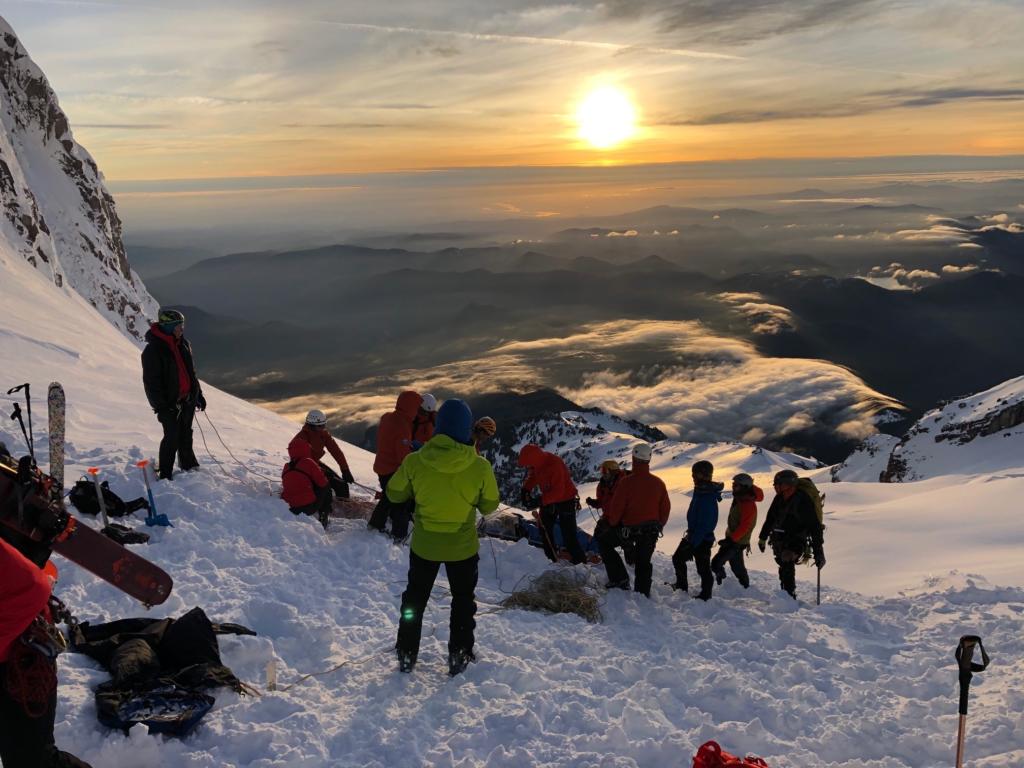A leader with the group Portland Mountain Rescue raised concerns Sunday that the high number of climbers packing Mount Hood are endangering themselves and the rescue crews who respond when something goes wrong.
Search and rescue crews responded to two separate incidents of stranded climbers in less than 24 hours, starting Friday night.
Mark Morford, a volunteer rescue leader with the nonprofit organization Portland Mountain Rescue, worked on the effort to bring down a climber caught in whiteout conditions Friday night. The man spent the night on Mount Hood and had hypothermia.
Mount Hood is usually packed with climbers on Memorial Day weekend, Morford said, but this year’s even more crowded.
“I think there’s a tremendous amount of pent up demand, people wanting to get out,” he said. “It looked like a conga line going up Hogsback … What a circus.”
Government officials have warned that as Oregon parks and trails start to reopen, people need to be careful to be careful to maintain distance from others and wear masks to reduce the spread of the coronavirus.
Morford said the routes to summit and climb down from Mount Hood consist of narrow, technically demanding chutes, and they pose immediate physical dangers as well, especially when multiple climbers at a time push through rather than going single file.
“People knock stuff down, including on each other, Morford said. “Every year somebody gets hurt just because of that. The mountain just can’t handle as many people as are up there.”
Plus, he said, climbers who should be back down from the mountain by midmorning are instead getting a late start.
Morford estimated that the two rescue missions so far this weekend involved roughly 50 volunteers and workers who are taking on additional risks because of the pandemic.
“That’s a lot of people that had to work together in close contact,” Morford said. “We have COVID protocols that we try to follow, but it’s extremely difficult to maintain those protocols through a long and complicated mission. So everyone’s bearing an additional risk, a risk in addition to the risk that rescuers normally have to deal with, because of the current pandemic.”
In light of that risk, search and rescue teams are pleading for people to avoid climbs and other ambitious treks that could wind up requiring an emergency response.
“This is not the time to try to do your first ski descent from Mount Hood,” Morford said, noting that many people are also out of shape and out of practice. “It’s not the time to try a challenging route … It’s a time to just enjoy the back country, be chill and enjoy conservative choices. Don’t push it.”
People who climb Mount Hood this weekend are also taking a chance because the avalanche danger is high due to warm weather and heavy recent snowfall that can more easily slide off the icy base underneath.
That’s what happened Saturday when a Colorado woman injured her ankle in a small avalanche on a challenging route. Morford said rescuers estimated the avalanche swept the woman and her climbing partner roughly 1,000 feet down the route and onto Reid Glacier.
The location made for a difficult rescue. Crews had to bring her farther up the mountain to reach a location from which they could ski down with her in a litter.
Normally, climbers could get detailed avalanche forecasts from the Northwest Avalanche Center. But the organization announced in mid-April it would stop producing the forecasts during the coronavirus pandemic to protect its employees and people who live near trailheads.
“Although we firmly believe in the value of backcountry travel it is not an essential activity that outweighs the importance of slowing the spread of this virus,” Forecast Director Dennis D’Amico and Executive Director Scott Schell wrote.
Morford said Portland Mountain Rescue also stopped posting data about mountain conditions “because we didn’t want to give people data that would help them climb.”



